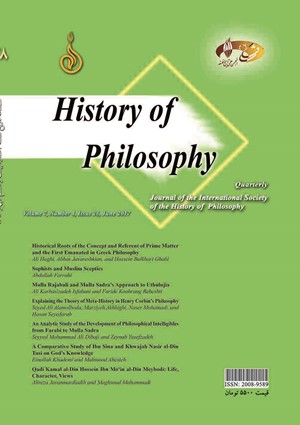Historical Roots of the Concept and Referent of Prime Matter and the First Emanated in Greek Philosophy
Subject Areas : Geneology of philosophical schools and Ideasali haghi 1 , Abbas Javareshkian 2 , Hossein Bulkhari Ghahi 3
1 - Ferdosi University
2 - Ferdosi University
3 - Ferdosi University
Keywords: history of philosophy prime matter the first emanated Greek philosophy Islamic philosophy ,
Abstract :
Undoubtedly, the history of philosophy follows a continuous and successive process of development in the course of human life. Although inventions and new problems and topics have always been witnessed and warmly welcomed in this field, they have never interrupted the continuous process of development of thought in the realm of philosophy. In fact, philosophy, which is the most illuminating dimension of human intellection on the history of thoughts, is responsible for the rational explanation of the most important issues in human life. Undoubtedly, one of the most important of all of them is clarifying the relationship between the Creator or Maker of the world and existents and creatures. Now, if we consider the rise of philosophy in Greece as a crucial event in the history of philosophy, the quality of the philosophical approach to prime matter and, then, the issue of the first emanated are viewed as two of the most significant and fascinating topics in this field. Following an analytic approach, the writers have tried to study the historical background of the first emanated in the history of Islamic philosophy (intellect as the first creation) with reference to Greek philosophy in this regard. The writers assume that the history of philosophy in Islamic civilization has been developed by deliberating over some Greek thoughts and has established the foundation of its own philosophical structure through a profound review of philosophical resources, such as the Qur’an and traditions, as the absolute center of this enterprise.
قرآن کریم. #
نهج البلاغه، ترجمه سیدجعفر شهیدی، تهران، شرکت انتشارات علمی و فرهنگی، 1384.#
ارسطو، مابعدالطبیعه، ترجمه محمدحسن لطفی، تهران، انتشارات حكمت، 1385. #
ارسطو، درباره نفس، ترجمه علیمراد داودی، تهران، انتشارات حكمت، 1393. #
افلاطون، دوره آثار افلاطون، ترجمه محمدحسن لطفی، تهران، نشر انجمن حکمت و فلسفه،1356. #
افلوطین، تاسوعات، تصحیح جیرار جهامی و سمیع دغیم، ترجمه فرید جبر، لبنان، بیروت، نشر بیروت، 1418.ق. #
افلوطین، دوره آثار افلوطین (تاسوعات)، ترجمه محمدحسن لطفی، تهران، چاپخانه نقش جهان، ج1، چ1، 1366. #
خامنهای، سیدمحمد، سیر حکمت در ایران و جهان، تهران، انتشارات بنیاد حکمت اسلامی صدرا، 1380. #
راسل، برتراند، تاریخ فلسفه غرب، ترجمه نجف دریا بندری، تهران ، نشر پرواز، ج1، 1365. #
غروی اصفهانی (کمپانی)، محمدحسین، دیوان مفتقر، تهران، نشر آفاق، 1380. #
کاپلستون، فردریک، تاریخ فلسفه، ج1، ترجمه سیدجلالالدین مجتبوی، تهران، نشر علمی فرهنگی، 1362. #
کرسون، آندره، فلاسفه بزرگ، ترجمه کاظم عبادی، تهران، انتشارات صفی علیشاه، 1363. #
گاتری، دبلیو، کی . سی، آناکسیمندر، آناکسیمنس، ترجمه مهدی قوام صفوی، تهران، انتشارات فکر روز، 1378. #
گومپرتس، تئودور، متفکّران یونانی، ترجمه محمدحسن لطفی، تهران، انتشارات خوارزمی، 1375. #
گرومن، پیتر، سرگذشت فیثاغورث، ترجمه پرویز حکیم هاشمی، تهران، نشر مرکز، 1366. #
مجلسی، محمدباقر، بحارالانوار، ترجمه ابوالحسن موسوی همدانی، تهران، نشر کتابخانه حضرت ولیعصر(عج)، 1363. #
ملکیان، مصطفی، مشتاقی و مهجوری ، تهران، نشر نگاه معاصر، 1386. #
Turner William, S. T. D, History of philosophy, Published by Global Vision, New Delhi, 2007. #
Zeller Edvard, History of Greek Philosophy, book from the collections of Harvard University, 2009. #


